Over the course of several hundred years, Americans, as well as Europeans, freed themselves from the past, transformed nature into a commodity, centralized political power, and instituted bureaucracies, all with the aim of making themselves happy in this world.
 Unlike Eve eating fruit from the forbidden tree, the beginning of the Second Fall can be precisely dated: In October 1620, Francis Bacon, the principal architect of the experimental method of modern science, published The Great Instauration. The word “instauration,” once a common English word, now sounds as if it belongs in a dreary Latin grammar book—instauro, instaurare, instauravi, instauratus. The Bing Dictionary gives an excellent definition of instauration: “the restoring of something that has lapsed or fallen into decay.”[1] Bacon argued that what had fallen into decay was human knowledge. In the Garden of Eden, Adam named the animals according to their nature and this knowledge gave Adam command over nature.
Unlike Eve eating fruit from the forbidden tree, the beginning of the Second Fall can be precisely dated: In October 1620, Francis Bacon, the principal architect of the experimental method of modern science, published The Great Instauration. The word “instauration,” once a common English word, now sounds as if it belongs in a dreary Latin grammar book—instauro, instaurare, instauravi, instauratus. The Bing Dictionary gives an excellent definition of instauration: “the restoring of something that has lapsed or fallen into decay.”[1] Bacon argued that what had fallen into decay was human knowledge. In the Garden of Eden, Adam named the animals according to their nature and this knowledge gave Adam command over nature.
So out of the ground the LORD God formed every beast of the field, and every bird of the air; and brought them to the man to see what he would call them; and whatsoever the man called every living creature, that was its name. The man gave names to all cattle, and to the birds of the air, and to every beast of the field.[2]
“The state of knowledge is not prosperous nor greatly advancing,” Bacon lamented, and declared, “a way must be opened for human understanding entirely different from any hitherto known.”[3] The main impediment to the advancement of knowledge was Aristotelian philosophy filled with “specious and flattering” propositions that gave rise to “contentious and barking disputation.”[4]
Aristotle’s principal error was his complete confidence in the senses, an error that became the medieval tag, “Nihil est in intellectu quod non sit prius in sensu.” (Nothing is in the intellect that was not first in the senses.) But for Bacon, “it is certain that the senses deceive.”[5] After the Fall, our intellects became clouded and we became too attached to the senses. Furthermore, Copernicus demonstrated that our senses give “false information;”[6] the Earth rotates around its north-south axis and traverses an orbit about the Sun, while the senses report the Earth is stationary. The geocentric cosmos resulted from Aristotle and Ptolemy trusting the senses to report the way things truly are.
To partially restore mankind to the Garden of Eden, the only time in human history that man had real authority over nature, a new science was needed “in order that the mind may exercise over the nature of things the authority which properly belongs to it.”[7]
Bacon was the first to enunciate the fundamental principle of modern science: “The testimony and information of the sense has reference always to man, not to the universe; and it is a great error to assert that the sense is the measure of things.”[8] But a total rejection of the senses is madness, so to arrive at trustworthy information about nature the senses must be assigned a limited role. In one sentence, Bacon presented the heart of the experimental method, something entirely new to mankind: “The office of the sense shall be only to judge of the experiment, and the experiment itself shall judge of the thing.”[9] Said another way, the scientist touches the experiment, and the experiment touches nature. The scientist has no direct contact with nature. No scientist has ever seen, or will ever see, with his or her own eyes a neutrino, the helical structure of DNA, or the background radiation left over from the Big Bang. Scientific instruments touch nature, and the physicist, the chemist, or the biologist reads the numerical outputs, analyzes the data, applies theories, and eventually discovers the real constituents of nature—subatomic particles, molecules, and genes.
Bacon introduced one other principle completely new to mankind: The true test of human knowledge is whether nature can be commanded, for “those twin objects, human knowledge and human power, do really meet in one; and it is from ignorance of causes that operation fails.”[10] While the goal of the new science is to “command nature in action,” the goal of Aristotelian philosophy was “to overcome an opponent in argument.”[11] Bacon tossed Aristotle on the trash heap of history, for implicit in Aristotelian physics is that terrestrial matter is obscure and barely knowable, and thus cannot be commanded.
The new science would make mankind the master and possessor of nature, much as Adam was in the Garden of Eden, a time when “man was immortal and able to meet God face to face.”[12] Assuming the Genesis story is consonant with other myths of Paradise, we can speculate that Adam was “happy, and did not have to work for his food: Either a Tree provided him with subsistence, or the agricultural implements worked for him of themselves, like automata.”[13]
Bacon delivered two admonitions to his successors about the use of the new experimental method. First, he admonished scientists that the study of no part of nature is forbidden; “for it was not the pure and uncorrupted natural knowledge whereby Adam gave names to the creatures according to their propriety, which gave occasion to the Fall.”[14] In their pursuit of the truth, scientists have a divine mandate to ignore religious dogmas, philosophical doctrines, and cultural taboos. In effect, Bacon sanctioned the separation of science from religion and philosophy.
Second, Bacon addressed “one general admonition to all—that they consider what are the true ends of knowledge, and that they seek it not either for pleasure of the mind, or for contention, or for superiority to others, or for profit, or fame, or power, or any of these inferior things, but for the benefit and use of life, and that they perfect and govern it with charity.”[15] The general admonition exposes an inherent flaw in the Great Instauration. Bacon hoped to restore man to the Garden of Eden intellectually, but knew man could not be restored morally.
In Bacon’s grand vision of the future of mankind, the command of nature will be given to morally corrupt men and women, simultaneously capable of great good and immense evil. In Dialogues Concerning Two New Sciences, Galileo announces his great discovery that terrestrial matter does indeed obey mathematical laws, and consequently the Earth and the stars are made of the same material. At the end of his treatise, Galileo applies his new knowledge discovered through the experimental method to the improvement of artillery. So much for Bacon’s general admonition. In the twentieth and the twenty-first centuries, laboratories worked for the benefit of life and the destruction of humanity, producing polio vaccine and thermonuclear weapons, aids for life and instruments of death.
In effect, Bacon rewrote the Bible. The Old Testament told how Adam and Eve were expelled from the Garden of Eden; the New Testament gave hope that what had been lost through the disobedience to God would be restored at some point through faith in Jesus Christ. In the new version of Genesis, the restoration of the lost Paradise was expected to come about not through faith, but from the “great mass of inventions”[16] that would flow forth from the new experimental science that would give mankind the command over nature that Adam had in the first Garden of Eden. As a result, the descendants of the first man and woman could on their own return to Paradise, and in this way “subdue and overcome the necessities and miseries of humanity”[17] that resulted from the expulsion of Adam and Eve to East of Eden, where women painfully suffered childbirth and the cursed ground brought forth thistles and thorns.
The great mass of inventions that flowed forth from the new science founded on experiment, not on the Aristotelian observation of nature, captivated peasants, shopkeepers, and intellectuals, alike. The number of significant inventions in sixteenth-century Europe was meager: the flush toilet, bottled beer, and the Mercator map projection. The century in which Newton died, the eighteenth, included inventions that would transform society, such as the Franklin stove, gas lighting, the Watt steam engine, the cotton gin, the flying shuttle, and smallpox vaccination.[18]
Bacon’s vision of a new Garden of Eden drew a buoyant optimism from the New Testament, the positive emotion accompanying the belief in the dawning of a new age heralding a bright future, where all the current ills of human life—poverty, illness, and strife—would be overcome. The United States Democratic Review, in 1853, predicted that “within half a century, machinery will perform all work—automata will direct them. The only tasks of the human race will be to make love, study, and be happy.”[19]
The attempt to institute Paradise on Earth was a bold, hubristic project, entirely new to mankind, and unwittingly a vast social experiment, arguably a failed one.
The great mass of inventions persuaded ordinary people that science was the only path to truth, and that was bad news for theologians, philosophers, and poets, for they could not command nature. Their prestige began a steady, irreversible decline. Today, no one looks to poetry or philosophy for poetic knowledge or philosophical insights into nature and human affairs, or to theology for killer arguments that demonstrate the existence of God. Science and technology paralyzed the vocal cords of philosophers, rendering them mute about the three big questions that every person asks in the course of his or her life: Where did I come from?, What am I doing here?, and, Where am I going?
The arts and the humanities are thought to deal with individual experiences, subjective opinions, and historical and cultural accidents, not universal truths. An essay written by six eminent professors of literature and published by the American Council of Learned Societies asserts that “all thought inevitably derives from particular standpoints, perspectives, and interests.”[20] The life of the mind for these humanists, then, cannot focus on the universality of human experience and must finally degenerate into an endless labyrinth of rhetoric about opinions and private interests.
Science as the only path to truth led invariably to materialism. The toolbox of science is limited to air pressure, chemical changes, electrical impulses in nerves, brain cell activity, and other measurable properties of matter, and thus the experimental method of science entails materialism.[21] Said in terms of modern reductionism, “the universe, including all aspects of human life, is the result of the interactions of little bits of matter.”[22] In addition, the amazing new inventions focused virtually everyone’s attention on the good life in this world, away from salvation, at the expense of intellectual and spiritual values, the usual definition of materialism. In this way, Bacon transformed Judeo-Christianity into a secular, materialistic philosophy, and no doubt he would be aghast, for he vigorously opposed atheism: “I had rather believe all the fables in the Legend[*], and the Talmud, and the Alcoran [the Koran], than that this universal frame is without a mind.”[23] He maintained that atheism reduces man to a mere animal: “They that deny a God destroy man’s nobility; for certainly man is of kin to the beasts by his body; and, if he be not of kin to God by his spirit, he is a base and ignoble creature.”[24]
With the denial of God in the Second Fall, history had to be rewritten. Karl Marx constructed a coherent, rational view of history to replace story of the unfolding relation between God and Man in the Hebrew Bible. First, Marx eliminated God in favor of Man. A person could be free and independent only if God does not exist: “A man who lives by the grace of another regards himself as a dependent being. But I live completely by the grace of another if I owe him not only the maintenance of my life but also its creation, if he is the source of my life. My life necessarily is grounded outside itself if it is not my own creation.”[25] In the future, humankind will be free because man creates man through economic production. “The whole of what is called world history is nothing more than the creation of man through human labor,” Marx declared.[26]
Second, Marx moved the Garden of Eden to the future. In The Communist Manifesto, Marx and Friedrich Engels described the future Paradise: “When, in the course of development, class distinctions have disappeared, and all production has been concentrated in the hands of a vast association of the whole nation, the public power will lose its political character. Political power, properly so called, is merely the organized power of one class for oppressing another.” In the grand vision of the Manifesto, history ends with the disappearance of oppressors and freedom for all: “In place of the old bourgeois society, with its classes and class antagonisms, we shall have an association in which the free development of each is the condition for the free development of all.”
Instead of a Paradise, the social experiment in the Soviet Union to establish the Kingdom of Heaven on Earth produced a nightmare with the deaths of over 15,000,000 people; later, Chairman Mao with the Great Leap Forward would top the Soviets with the murder of 30,000,000 people. Maybe, Pol Pot should win the prize for total revolution. He and his Khmer Rouge restarted civilization in the Year Zero, the time when revolutionary ideals replaced all culture and traditions within a society. Slave labor, malnutrition, poor medical care, and executions killed a quarter of the population of Cambodia.[27][†]
In his monumental study, The Gulag Archipelago, Aleksandr Solzhenitsyn documented the torture and mass killings of the Soviet regime. At Solovki, guards poured cold water on the prisoners in subzero temperatures; in summer, naked prisoners were tied to trees to be devoured by mosquitoes. The prisoners at Zrossky Springs were so famished they ate a horse, dead for more than a week and covered with flies and maggots. At Utiny Goldfields, the prisoners ate half a barrel of lubricating grease. At Mylga, they ate Iceland moss, like the deer. In 1938, the NKVD (People’s Commissariat of Internal Affairs) circulated the secret instruction to reduce the number of prisoners held in the camps by the use of disease, starvation, and murder.[28]
In the winter of 1931-1932, 100,000 prisoners died constructing the White Sea Canal. Dmitri Vitkovsky, a work supervisor, who saved many lives with the falsification of work records, describes the end of the workday: “There were corpses left on the work site. The snow powdered their faces. One of them was hunched over beneath an overturned wheelbarrow; he had hidden his hands in his sleeves and frozen to death in that position. Someone had frozen with his head bent down between his knees. Two were frozen back to back leaning against each other…. At night, the sledges went out and collected them. The drivers threw the corpses onto the sledges with a dull clonk.”[29]
That is how 2,000,000 or more Soviet citizens died in the failed attempt to establish Paradise on Earth.
The Nazi rewrite of history eliminated the Jews in favor of the Aryans and replaced the Garden of Eden with an Aryan Paradise on Earth.
To demonstrate that the Aryans were the chosen people, Adolf Hitler, Heinrich Himmler, and Adolf Eichmann murdered six million Jews and disposed of their bodies in mass graves and factory crematoria. The Nazi theologians argued, “How could the Jews be the chosen people, when we use their ashes for tire traction on ice? Therefore, we are the chosen people. Q.E.D.” Primo Levi, a survivor of Auschwitz, locates the foundation of Nazi doctrine as anti-Semitism. For the Nazis, he writes, “the Jews could not be ‘the people elected by God,’ since that’s what the Germans were.”[30]
To give scientific authority to his ideas on race, Hitler drew upon the social Darwinian principle that nature destroys the weak. For the Fűhrer, all life was an eternal struggle, the world a jungle where the fittest survived and the strongest ruled—“the world of everlasting struggle, where one creature feeds on the other and where the death of the weaker implies the life of the stronger.”[31] Mein Kampf is peppered with social Darwinian pronouncements: “In the end, the instinct of self‑preservation alone will triumph… Man has grown great through perpetual struggle. In perpetual peace, his greatness will decline…. The stronger must dominate and not mate with the weaker… Only the born weakling can look upon this as cruel.”[32]
To ensure racial purity, the Nazis, in 1933, introduced compulsory sterilization for congenital mental defects, schizophrenia, manic-depressive psychosis, and hereditary diseases such as epilepsy and chorea.
Konrad Lorenz, later to receive the Noble prize for co-founding the science of animal behavior with Nikko Tinbergen[‡] and Karl von Frisch, gave, in 1940, the medical “argument” for racial purity: “There is a certain similarity between the measures which need to be taken when we draw a broad biological analogy between bodies and malignant tumors, on the one hand, and a nation and individuals within it who have become asocial, because of their defective constitution, on the other hand… The elimination of such elements is easier for the public health physician and less dangerous for the supra‑individual organism, than such an operation by a surgeon would be for the individual organisms.”[33]
Despite the Germanic wordy circumlocution, some physicians heeded Lorenz’s ideas on racial purity, especially when he stated without ambiguity, “It must be the duty of racial hygiene to be attentive to a more severe elimination of morally inferior beings than is the case today.”[34]
Hitler declared, “Conscience a Jewish invention…a blemish like circumcision.”[35] The revaluation of all values adopted from the philosopher Friedrich Nietzsche demanded that an ardent Nazi break free from constraints of conscience and the emotional barriers against cruelty. The central Nazi moral principle was inferior peoples are raw material for the establishment of a glorious Paradise on Earth based on race. In such a future paradise, the Aryans will elevate human achievements to undreamed of heights.
The Nazi attempt to establish an Aryan Paradise on Earth was a disaster for humankind.
During la Belle Époque, usually dated from the end of the Franco-Prussian War in 1871 to the outbreak of World War I in 1914, the Garden of Eden was visible from Europe and America; at the close of the insane war in 1918, in Western democracies Paradise on Earth slipped below the horizon.
Over the course of several hundred years, Americans, as well as Europeans, freed themselves from the past, transformed nature into a commodity, centralized political power, and instituted bureaucracies, all with the aim of making themselves happy in this world. Those twin objects of Bacon, human knowledge and human power, produced staggering wealth, eradicated numerous diseases, eliminated famine, and reduced backbreaking labor to all but non-existence. Although much of the wealth generated by science and technology was not distributed justly, nevertheless, except for the relatively small numbers of homeless and destitute, Westerners were incredibly wealthy by historical standards.
Today, while advanced medical technology is making substantial progress in treating the physical diseases of Western civilization—cancer, atherosclerosis, and diabetes—the diseases of the interior life are taking over—alcohol and drug abuse, sex addiction, binge eating, and depression. From interviews with 39,000 persons, the authors of a paper published in the Journal of the American Medical Association concluded that in the industrialized world the rates of severe, often incapacitating depression have increased in each succeeding generation since 1915.[36] A 2011 study by the Centers for Disease Control and Prevention found that between 1988 and 2008 the rate of antidepressant use by all ages in the United States increased nearly 400 percent; eleven percent of Americans aged twelve years and over now take antidepressant medication.[37] Since the 1930s, anxiety and depression among young people in America have steadily increased.[38] The World Health Organization predicts that by 2020 depression will be the second most prevalent medical condition in the world.[39] These data support the general conclusion that modern life is bad for mental health
Bacon imagined a glorious future for us once our ancestors made themselves the masters and possessors of nature; however, the ever-ascending arc of science and technology turned out to be not under human control. Physicists, neuroscientists, and computer and genetic engineers are the new sorcerer’s apprentices, having summoned great forces that they now cannot either control or banish. Science and technology became the masters and possessors of us.
No one knows how molecular nanotechnology, genetic engineering, and artificial intelligence will transform human life, not the engineers at M.I.T., the geneticists at Stanford, or the computer scientists in Silicon Valley. Perhaps the ever-ascending arc of science and technology is headed to superintelligence, maybe to a thermonuclear war that annihilates humankind, or possibly to a severe climate change that destroys Homo sapiens and most other creatures.
Even if the terrible wars and political crimes against humanity of the twentieth century belong to a darker age, the West still faces the brick wall of personal discontent and social disintegration—youth suicide, drug addiction, and violent crime plague every industrial society. The educated and well-off surrounded by affluence are prone to loneliness, depression, and malaise. Bacon’s secular vision to create through science and technology a Paradise on Earth ended in a series of social and political catastrophes. Hiroshima killed the comforting narrative that the progress of science and technology leads to universal happiness; the Gulag destroyed the utopian story of humans instituting a perfect political order; the Holocaust annihilated Nietzsche’s myth that the ascendance of the Overman, the perfect race, will raise humankind to a new level of existence. The grand storytelling of Post-Christianity is over.
The Imaginative Conservative applies the principle of appreciation to the discussion of culture and politics—we approach dialogue with magnanimity rather than with mere civility. Will you help us remain a refreshing oasis in the increasingly contentious arena of modern discourse? Please consider donating now.
Notes:
[*] The Golden Legend is a thirteenth-century collection of saints’ lives.
[†] This figure does not include the 100,000 Cambodians peasants killed in the 1972-1973 bombing campaign initiated by President Richard Nixon and Secretary of State Henry Kissinger. The number of bombs dropped on Cambodia was over three times that dropped on Japan in World War II. So much for technological progress.
[‡] The Dutchman Nikko Tinbergen, an outspoken foe of Nazism, spent two years interned in a Nazi concentration camp.
[1] As far as I could determine, the Microsoft Bing Dictionary is out of print and is no longer available online.
[2] Genesis 2:19-20. RSV
[3] Francis Bacon, The New Organon and Related Writings (Indianapolis, IN: Bobbs-Merrill, 1960 [1620]), p. 7.
[4] Ibid., p. 8.
[5] Ibid., p. 21.
[6] Ibid.
[7] Ibid., pp. 3, 7. Italics added.
[8] Ibid.
[9] Ibid., p. 22.
[10] Ibid., p. 29.
[11] Ibid., p. 19.
[12] Mircea Eliade, Myths, Dreams, and Mysteries, trans. Philip Mairet (New York: Harper, 1960), p. 43.
[13] Ibid.
[14] The New Organon, p. 15.
[15] Ibid.
[16] Ibid., p. 103.
[17] Ibid., p. 23.
[18] For a timeline of inventions, see Eighteenth Century Inventions.
[19] “The Spirit of the Times,” The United States Democratic Review 33 (Issue 8, Sept. 1853): 261.
[20] George Levine et al., “Speaking for the Humanities,” American Council of Learned Societies Occasional Paper no. 7 (1989): 10.
[21] For a detailed discussion, see George Stanciu, “Materialism: The False God of Modern Science,” The Imaginative Conservative (July 20, 2016).
[22] H. Allen Orr, “Awaiting a New Darwin,” The New York Review of Books, 60, No. 2 (February 7, 2013).
[23] Francis Bacon, “Of Atheism” in Essays, Civil and Moral.
[24] Ibid.
[25] Karl Marx, “Economic and Philosophical Manuscripts,” in Early Writings, trans. Rodney Livingstone and Gregor Benton (New York: Penguin, 1992), p. 356. Italics in the original.
[26] Ibid., p. 357. Italics in the original.
[27] For a discussion of genocide in the century of mass murder, see Lewis M. Simons, “Genocide and the Science of Proof,” National Geographic Magazine (January, 2006): 28-35 and Timothy Snyder, “Holocaust: The Ignored Reality,” The New York Review of Books (July 16, 2009).
[28] Aleksandr I. Solzhenitsyn, The Gulag Archipelago, 1918-1956: An Experiment in Literary Investigation Part III and IV, trans. Thomas P. Whitney (New York: Harper & Row, 1973), pp. 54, 126.
[29] Dmitri Vitkovsky, quoted in Aleksandr I. Solzhenitsyn, The Gulag Archipelago, 1918-1956: An Experiment in Literary Investigation Part III and IV, trans. Thomas P. Whitney (New York: Harper & Row, 1973), p. 99.
[30] Primo Levi, The Drowned and the Saved, trans. Raymond Rosenthal (New York: Vintage, 1989), p. 179.
[31] Adolf Hitler, Mein Kampf, 1925 and 1926, trans. James Murphy, Vol. II, Ch. 15.
[32] Ibid., Vol. I, Ch. 4, Ch. 4, Ch. 11, Ch. 11.
[33] Konrad Lorenz, quoted by Benno Muller-Hill, Murderous Science: Elimination by Scientific Selection of Jews, Gypsies, and Others in Germany, 1933-1945 (Cold Spring Harbor, New York: Cold Spring Harbor Laboratory Press, 1997), p. 15.
[34] Konrad Lorenz, quoted by Robert Jay Lifton, The Nazi Doctors: Medical Killing and the Psychology of Genocide (New York: Basic Books,2000), p. 134.
[35] Herman Rauschning, Hitler Speaks: A series of Political Conversations with Adolf Hitler on His Real Aims (Whitefish, Montana: Kessinger, 2010 [1939]), p. 220.
[36] Cross-National Collaborative Group, “The changing rate of major depression,” Journal of the American Medical Association (1992 December 2) 268 (21): 3098–3105.
[37] NCHS Data Brief, “Antidepressant Use in Persons Aged 12 and Over: United States, 2005–2008.”
[38] Jean M. Twenge, Brittany Gentile, Nathan DeWall, Debbie Ma, Katharine Lacefield, and David R. Schurtz, “Birth cohort increases in psychopathology among young Americans, 1938–2007: A cross-temporal meta-analysis of the MMPI,” Clinical Psychology Review 30 (2010): 145–154.
[39] World Health Organization, Mental Health: A Call For Action by World Health Ministers.
The featured image is a detail of The Three Ages of Man (c. 1512-1513) by Titian (1490–1576) and is in the public domain, courtesy of Wikimedia Commons. It has been brightened for clarity.


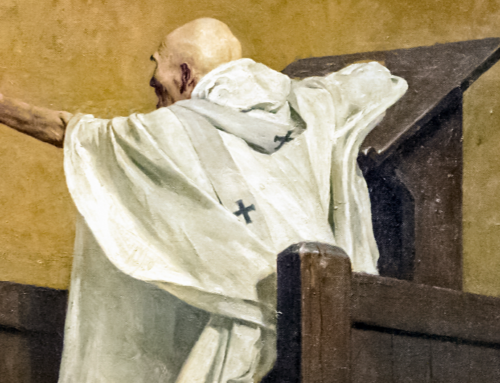
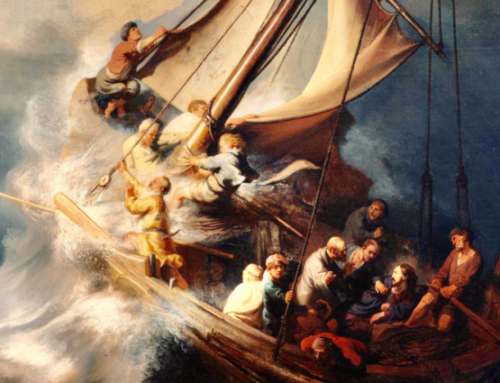
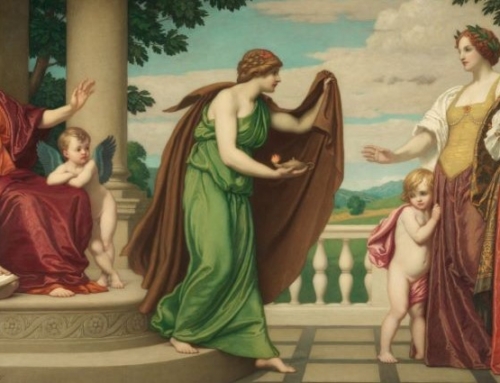
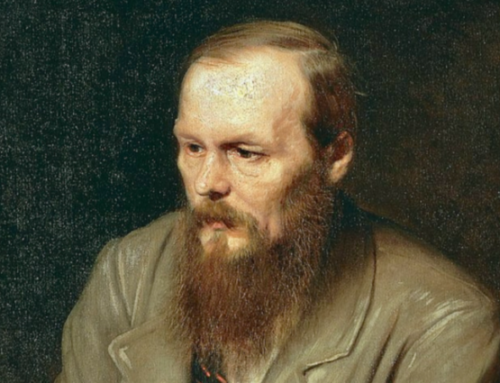
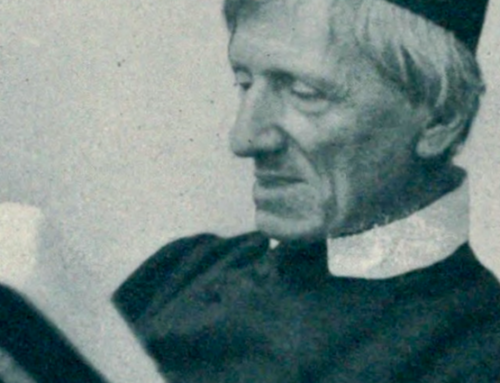
A very rich synthesis of ideas and their historical consequences. Thank you. I challenge you to pen another article that moves beyond the diagnosis to the cure.
“The Second Fall” by George Stanciu has a short form: Faith and Reason (science) must inform one another. When this relationship is absent or aberrant (as it always is in pseudo-science), terrible things happen.
Fantastic article–thank you. What a great and true line: “Physicists, neuroscientists, and computer and genetic engineers are the new sorcerer’s apprentices, having summoned great forces that they now cannot either control or banish.”
The Ancient Greeks can still teach us some wisdom.
Their first virtue was Piety which in itself could take an essay to explain.
Every scientific discovery simply proves how great God is. Every contemplation of what to do next is a credit to Gods gift of reasoning. etc.